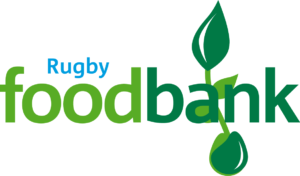7394 emergency food parcels provided to people facing hardship by Rugby Foodbank in the past 12 months
- Alarmingly more than 2835 of the parcels were provided for children
- The charity is calling for a stronger social security system that ensures we can at least cover life’s essentials, like food, heating, and clothes
- New annual figures from the Trussell Trust show that almost 3 million (2,986,203) food parcels were given out across the UK – more than ever before
New figures released today by Rugby Foodbank have revealed that 7394 emergency food parcels were provided to people facing hardship across Rugby in the last year – with 2835 of these going to children.
Rugby Foodbank has seen a 34% increase in the number of emergency food parcels distributed compared to last year. This is the most parcels the Foodbank has ever provided.
The levels of need were particularly acute in winter, and December was the busiest month for Rugby Foodbank, with 1318 emergency food parcels provided by staff and volunteers this month.
Adi Robinson, Service Delivery Manager at Rugby Foodbank commented,
“This year it has been really hard. We see peaks and troughs of demand but this year, when running our monthly stats, most months I was sadly saying we’ve reached a new level that we never wanted to reach. By December we had already helped more people than in the whole of the previous year. The level of benefits, especially benefits for people who are sick and disabled, needs to be high enough for people to live and at the moment they’re not high enough for people to even exist, and there is an enormous difference between existing and living. However, we are continuing to develop our Financial Inclusion partnership with our local Citizens Advice referring our clients to a dedicated advisor to delve deeply into the underlying causes of crisis including debt and income maximisation. We know this is having a really positive impact helping to put money back into people’s pockets.”
One food bank client who claims Universal Credit said “I already have days where there is no gas or electricity in the property, and we already skip meals and go without basic items. I am worried that this is going to happen more often and, on a lot more days of the month.”
In response to the local and national figures Diana Mansell, Chair of the Hope4, which runs both the foodbank and the Hope Centre added, “To say it’s been a really hard 12 months doesn’t seem to quite do it justice. It has always been an emotional place to work. There are highs and lows. You see two sides – our amazing volunteers and such a great wealth of community support. It really buoys you up to see how the community comes together to support one another. But when people come to us, they are often coming at the lowest points of their lives, or they’re working through something really challenging. I want to thank everyone involved for their amazing ongoing support and assure you all we will be here until food banks are no longer needed, but the current situation is not one we can solve alone. Rugby Foodbank was set up to provide short-term support to people in an emergency, it is not a lasting solution to hunger and poverty. More than three quarters of the UK population agree with us that they should not need to exist. Therefore, we fully support The Trussell Trust’s request that the UK government embeds in our social security system the widely supported principle that, at a minimum, Universal Credit should protect people from going without essentials. Please support the Trussell Trust’s Guarantee our Essentials campaign.”
Rugby Foodbank is part of the Trussell Trust’s network, which reports record levels of need in the last 12 months with almost 3 million (2,986,203) emergency food parcels provided to people facing hardship between April 2022 and March 2023. More than a million of these parcels were provided for children.
Speaking about the rising need for emergency food, Emma Revie, Chief Executive at the Trussell Trust, said:
“These new statistics are extremely concerning and show that an increasing number of people are being left with no option but to turn to charitable, volunteer-run organisations to get by and this is not right. The continued increase in parcel numbers over the last five years indicates that it is ongoing low levels of income and a social security system that isn’t fit for purpose that are forcing more people to need food banks, rather than just the recent cost of living crisis or the COVID-19 pandemic.
To help ensure that everyone has the income they need to afford the essentials, the Trussell Trust has joined with Joseph Rowntree Foundation in urging the UK government to embed in law an ‘Essentials Guarantee’ that would make sure Universal Credit payments always, at a minimum, provide enough to the cover cost of essentials such as food, utilities and vital household goods.
